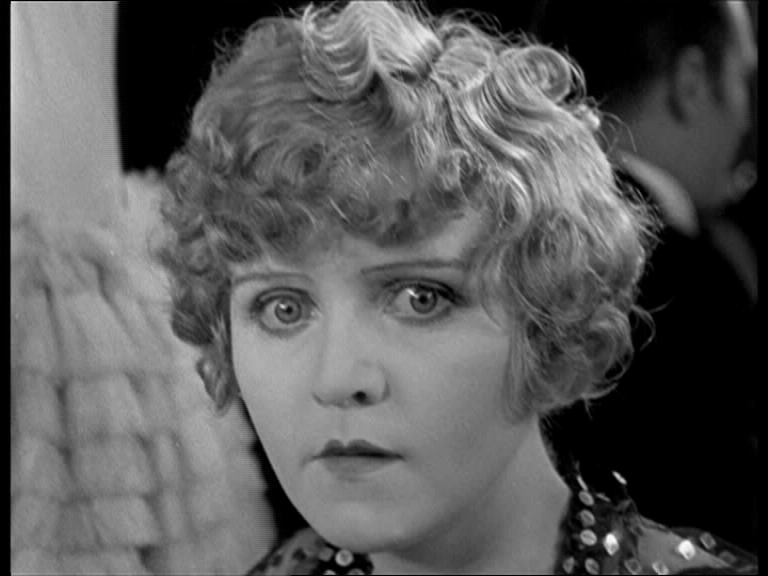Run Time: 86 minutes. Studio: British International Pictures. Director: Alfred Hitchcock. Writers: Alfred Hitchcock, Walter C. Mycroft, Eliot Stannard. Main Cast: Betty Balfour, Jean Bradin, Ferdinand von Alten, Gordon Harker. Cinematographer: Jack E. Cox.
When François Truffaut did his book long interview with Alfred Hitchcock, Hitch described Champagne as "the lowest ebb in my output." As much as I love Hitchcock as a director, I have to disagree with him here. Sure, this is not at the level of say Rear Window (1954) or Notorious (1946), but it is nowhere near being a bad movie. Truffaut also did not agree with his hero's assessment saying, "That's not fair. I enjoyed it. Some of the scenes have the lively qualities of the Griffith comedies." It has to be asked then why did Hitch view this film with such distain? The answer is actually quite simple in my opinion. Hitch was a director who wanted to make movies his own way. Throughout that book long interview, the pictures he dismissed and didn't wish to talk about were the ones that were not his idea and or the ones where he could not exercise the amount of creative control he wanted to. The movie Alfred Hitchcock wanted to make would have been vastly different. Hitch envisioned a story about a French girl working in a factory bottling champagne. She associates this champagne with glamor and sophistication, two things she is longing for. However, a trip to the city shows her quite the opposite and that this romantic drink only leads to violence, misery and drunkenness. When she returns to her job, she now views this drink as poison. British International Pictures had little interest in such a story and Hitch and his cowriters wrote this romantic comedy pretty much on the cuff, sometimes only finishing writing a scene minutes before that scene needed to be shot. With this in mind, it is easy to see why the director may not have been too fond of this picture.
In this light comedy, a spoiled heiress (Betty Balfour) has a fiancée that her father, known as "The Champagne King" (Gordon Harker) does not approve of. Because of this he decides to teach her a lesson by making her think that they have lost all their money.
This is only Hitchcock's 8th picture, but he is clearly already a master filmmaker. He shows a technical mastery of the film medium that is truly incredible. Watching this movie, it is easy to see why even today, young filmmakers study Alfred Hitchcock's movies so closely. It is hard to find a better teacher for filmmaking than Hitchcock. Hitch and cinematographer Jack E. Cox (who worked on many of Hitch's British movies) create images and visual moments that stay in one's mind long after the movie is over. Even those who do not like this movie will have to admit it is technically well made. The story is typical of Hitch's light comedies of this time. It is fast moving, breezy and never overstays its welcome. The characters are quite likable and charming, and the actors are quite good in their roles. With a few exceptions (a scene with a drunk on a boat stands out) this film may not be laugh out loud funny, but the humor is quite charming and always puts a smile on my face. It may not be anything especially memorable or original, but it certainly is fun.
Betty Balfour was a popular comic actress in Britian around this time and the studio insisted on her being in this movie. Hitch and her did not get along at all and he would later refer to her as a "piece of suburban obscenity." Despite this though she does turn in a fine performance as the lead character. It is certainly easy to see why she was so popular in her day. Balfour was referred to as ‘Britain’s answer to Mary Pickford’ and ‘Britain’s Queen of Happiness’. Her most famous character was a cockney flower girl with a heart of gold named Squibs Hopkins. She played this character in five movies, Squibs (1921), Squibs Wins the Calcutta Sweep (1922), Squibs M.P. (1923), Squibs' Honeymoon (1923), Squibs (1935). The last of these was a talkie remake of the original film in the series. Sadly only Squibs (1935) and Squibs Wins the Calcutta Sweep exist today. Gordon Harker, while far from a household name, may be familiar to fans of Alfred Hitchcock's silent films. This is his third movie for Hitch, as he had previously been in The Ring (1927) and The Farmer's Wife (1928). He would later appear in one more Hitchcock movie, this time a talkie, Elstree Calling (1930).
If you are looking for a forgotten Hitchcock classic, you should look elsewhere. However if you want a fast paced and fun movie that features some masterful visual filmmaking, this is a really delightful movie.
Resources Used
https://www.tcm.com/tcmdb/title/449786/champagne#articles-reviews?articleId=72458
https://allthingsjenglish.wordpress.com/2015/05/01/1927-betty-balfour-the-countrys-favourite-world-star/
Hitchcock by François Truffaut
The Alfred Hitchcock Encyclopedia by Stephen Whitty

No comments:
Post a Comment